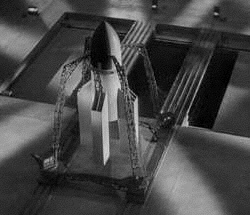
The Woman in the MoonIt's in many ways a clumsy film, and very slowly paced (running 2 hours 43 minutes). The first hour and a quarter are taken up with the plans for the spaceship being stolen by a consortium who wants to gain control of the gold the voyagers expect to find on the moon, and their forcing the scientist, Helius (Willy Fritsch) to accept their dubious representative 'Turner' (Fritz Rasp) on board. There is also a love triangle between Helius, his assistant engineer, Windegger (Gustav von Wagenheim) and Windegger's fiancee, Friede (Gerda Maurus).  The
next forty minutes detail the preparation and firing of the rocket, and the
space flight. Lang, who also co-wrote the script with his wife, Thea von Harbou,
had the co-operation of a rocket scientist, Hermann Oberth, and though rocket
science was very much in its infancy the scientific background was carefully
researched. The result is surprisingly prophetic, with a three-stage rocket
lifting the moon-landing module very much as in the real moon landing forty
years later: there are some understandable errors - the rocket is partially
immersed in water before takeoff to increase stability (it would surely have
made the stability worse); and the take-off is sudden - no-one could have
foreseen the sight of a Saturn rocket standing on its tail and lifting slowly. A
reasonable shot is made at representing weightlessness on the voyage; the
controls are more reminiscent of an electricity generating station than a
spaceship, but again given the period this is reasonable
enough. The
next forty minutes detail the preparation and firing of the rocket, and the
space flight. Lang, who also co-wrote the script with his wife, Thea von Harbou,
had the co-operation of a rocket scientist, Hermann Oberth, and though rocket
science was very much in its infancy the scientific background was carefully
researched. The result is surprisingly prophetic, with a three-stage rocket
lifting the moon-landing module very much as in the real moon landing forty
years later: there are some understandable errors - the rocket is partially
immersed in water before takeoff to increase stability (it would surely have
made the stability worse); and the take-off is sudden - no-one could have
foreseen the sight of a Saturn rocket standing on its tail and lifting slowly. A
reasonable shot is made at representing weightlessness on the voyage; the
controls are more reminiscent of an electricity generating station than a
spaceship, but again given the period this is reasonable
enough. There
are tensions between the crew - Helius and Windegger, both in love with Friede,
who has insisted on coming, an elderly scientist, and Turner, the slimy
representative of the consortium - and the discovery of a stowaway, a small boy
with an obsession about space travel gained from cheap comics. Despite some
variable special effects, the landing is shown convincingly (if rather fast -
the speed of landing would have smashed the module) and the lunar surface is
represented by hundreds of tons of sand imported into the studio (though the
backdrop of the mountains does look rather like something out of
Méliès). There
are tensions between the crew - Helius and Windegger, both in love with Friede,
who has insisted on coming, an elderly scientist, and Turner, the slimy
representative of the consortium - and the discovery of a stowaway, a small boy
with an obsession about space travel gained from cheap comics. Despite some
variable special effects, the landing is shown convincingly (if rather fast -
the speed of landing would have smashed the module) and the lunar surface is
represented by hundreds of tons of sand imported into the studio (though the
backdrop of the mountains does look rather like something out of
Méliès).Unfortunately as this point the film takes a lurch away from scientific accuracy into comic-book melodrama with the discovery of a breathable atmosphere. Lang must have know the moon was airless, but I suppose the main problem was the difficulty of having everyone in spacesuits. There is a good deal of over-acting: Windegger becomes more and more cowardly and hysterical: he fights with Turner, who is killed but who damages the oxygen reserve with a pistol shot. As a result someone has to stay behind: Windegger is chosen by lot but reacts so hysterically that Helius drugs him and (leaving the boy to pilot the ship) stays behind with a tent and supplies in the hope of being rescued: he discovers that Friede has also stayed. All arrant nonsense, but still enjoyable; the film really stands on its central section, which introduced, for purely dramatic reasons, the count-down which has become standard on all rocket launches. The film also had an unintended effect: Oberth had been unable to get funding for his experiments, but the interest provoked by the film gained him enough funding to carry out serious developments (among his assistants was a young Wehrner von Braun). Eight years later the Nazis suppressed the film because it was too close for comfort to the ballistic rocket weapons they were developing, which became the V1 and V2 rocket bombs of 1944/5. Eureka's print is excellent, crisp and detailed and with remarkably few marks: the piano score is just barely adequate, though I wish they'd tuned the piano better - perhaps someone thought silent films ought to be accompanied on a tatty piano. Eureka know better than that. Posted: Mon - February 25, 2008 at 08:50 AM by Roger Wilmut |
Quick Links
About Me:
Roger Wilmut XML/RSS Feed
MY PODCAST
Archives
Calendar
Blogroll
WEBRINGS
Statistics
Total entries in this category: Published On: Mar 11, 2016 05:00 PM |
||||||||||||||||||


